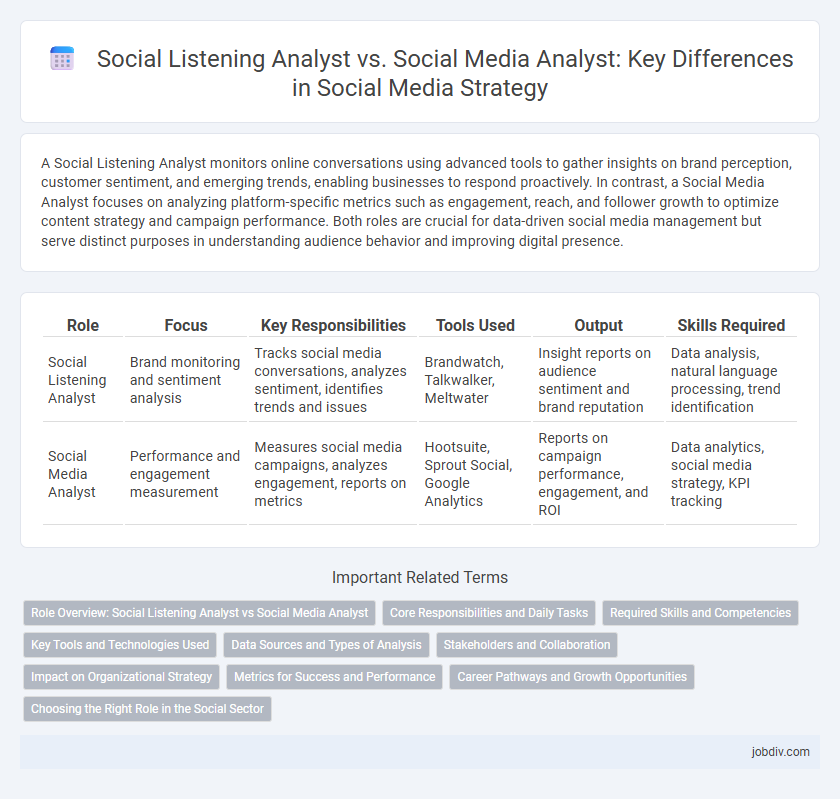A Social Listening Analyst monitors online conversations using advanced tools to gather insights on brand perception, customer sentiment, and emerging trends, enabling businesses to respond proactively. In contrast, a Social Media Analyst focuses on analyzing platform-specific metrics such as engagement, reach, and follower growth to optimize content strategy and campaign performance. Both roles are crucial for data-driven social media management but serve distinct purposes in understanding audience behavior and improving digital presence.
Table of Comparison
| Role | Focus | Key Responsibilities | Tools Used | Output | Skills Required |
|---|---|---|---|---|---|
| Social Listening Analyst | Brand monitoring and sentiment analysis | Tracks social media conversations, analyzes sentiment, identifies trends and issues | Brandwatch, Talkwalker, Meltwater | Insight reports on audience sentiment and brand reputation | Data analysis, natural language processing, trend identification |
| Social Media Analyst | Performance and engagement measurement | Measures social media campaigns, analyzes engagement, reports on metrics | Hootsuite, Sprout Social, Google Analytics | Reports on campaign performance, engagement, and ROI | Data analytics, social media strategy, KPI tracking |
Role Overview: Social Listening Analyst vs Social Media Analyst
A Social Listening Analyst specializes in monitoring and analyzing online conversations and sentiment across social media platforms to identify trends, customer opinions, and emerging issues for strategic insights. A Social Media Analyst focuses on measuring, reporting, and optimizing social media campaigns' performance through metrics such as engagement rates, reach, and conversion data. Both roles utilize data analytics but differ in scope, with Social Listening Analysts emphasizing broader consumer behavior and Social Media Analysts targeting platform-specific content effectiveness.
Core Responsibilities and Daily Tasks
Social Listening Analysts specialize in monitoring and analyzing online conversations and sentiment across social platforms to uncover trends and consumer insights, using tools like Brandwatch or Talkwalker. Social Media Analysts focus on evaluating engagement metrics, campaign performance, and audience demographics to optimize content strategies and improve ROI, leveraging platforms such as Hootsuite or Sprout Social. Both roles require data interpretation and reporting but differ in their emphasis on sentiment analysis versus content performance evaluation.
Required Skills and Competencies
A Social Listening Analyst requires expertise in sentiment analysis, trend detection, and proficiency with social listening tools like Brandwatch and Talkwalker to monitor brand reputation and consumer insights. In contrast, a Social Media Analyst focuses on campaign performance metrics, audience engagement, and platform-specific analytics using tools such as Google Analytics, Sprout Social, and Hootsuite. Both roles demand strong analytical abilities and data interpretation skills, but the Social Listening Analyst emphasizes real-time brand sentiment, while the Social Media Analyst prioritizes optimizing content strategy and engagement metrics.
Key Tools and Technologies Used
Social Listening Analysts primarily utilize tools like Brandwatch, Talkwalker, and Sprinklr to monitor brand sentiment and track online conversations across multiple platforms. Social Media Analysts often rely on platforms such as Hootsuite, Buffer, and Google Analytics to measure engagement metrics and optimize social content strategies. Both roles leverage AI-driven analytics and natural language processing technologies for deeper insights into audience behavior and trends.
Data Sources and Types of Analysis
Social Listening Analysts primarily utilize data from social media platforms, forums, blogs, and review sites, focusing on sentiment analysis, trend identification, and brand reputation monitoring. Social Media Analysts concentrate on platform-specific metrics such as engagement rates, follower growth, and content performance, leveraging data from dashboards like Facebook Insights and Twitter Analytics. Both roles employ advanced tools and qualitative analysis, but Social Listening Analysts emphasize real-time public opinion while Social Media Analysts focus on optimizing content strategy and audience engagement.
Stakeholders and Collaboration
Social Listening Analysts primarily collaborate with brand managers, customer service teams, and market researchers to interpret consumer sentiment and identify emerging trends, enabling informed product development and reputation management. Social Media Analysts work closely with marketing teams, content creators, and advertising specialists to optimize campaign performance and audience engagement through detailed social metrics. Both roles require strong stakeholder communication skills, but Social Listening Analysts emphasize cross-departmental insight sharing, while Social Media Analysts focus on tactical execution and campaign adjustments.
Impact on Organizational Strategy
A Social Listening Analyst impacts organizational strategy by providing real-time insights into consumer sentiment, brand reputation, and emerging trends through the analysis of social conversations and mentions. In contrast, a Social Media Analyst focuses on performance metrics, engagement rates, and content optimization across platforms to enhance marketing campaigns and audience targeting. Integrating both roles drives a data-informed strategy, aligning customer feedback with actionable social media tactics to improve brand positioning and competitive advantage.
Metrics for Success and Performance
Social Listening Analysts prioritize metrics such as sentiment analysis, brand mentions, and emerging trend identification to gauge public perception and inform strategic decisions. Social Media Analysts focus on engagement rates, follower growth, and content reach metrics to evaluate campaign effectiveness and audience interaction. Both roles leverage data-driven insights but differ in their emphasis on qualitative social sentiment versus quantitative social media performance.
Career Pathways and Growth Opportunities
Social Listening Analysts specialize in monitoring and interpreting online conversations to identify consumer sentiment and emerging trends, offering insights crucial for brand reputation and product development. Social Media Analysts focus on campaign performance, engagement metrics, and audience demographics to optimize content strategies and increase reach. Career growth for Social Listening Analysts often progresses towards market research or consumer insights roles, while Social Media Analysts typically advance into strategic marketing, digital advertising, or social media management positions.
Choosing the Right Role in the Social Sector
Social Listening Analysts specialize in monitoring and interpreting online conversations to gauge public sentiment and emerging trends, crucial for reputation management and strategic decision-making. Social Media Analysts focus on analyzing engagement metrics, content performance, and audience demographics to optimize social media campaigns and enhance brand presence. Choosing the right role depends on whether the priority lies in real-time audience insights and sentiment analysis or in data-driven content strategy and campaign effectiveness within the social sector.
Social Listening Analyst vs Social Media Analyst Infographic

 jobdiv.com
jobdiv.com